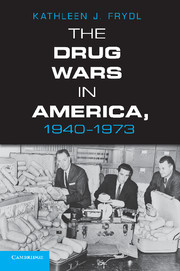Summary
In 2010, California voters considered – and rejected – a ballot proposition to legalize the cultivation and consumption of marijuana. Most voters wrestled with this decision while bearing in mind other illicit drugs, wondering whether legalizing marijuana would affect the moral and legal case for outlawing substances considered more potent and destructive. Could a pragmatic concession on one drug set an unwelcome precedent for the entire scheme of prohibition of illicit drugs?
Yet it is illicit drug prohibition itself that is the historical aberration, a labored and in many ways radical construction of some of the most formative decades in modern American history. Most assume that it is the result of President Richard Nixon’s declaration of a “war on drugs”; in fact, his announcement only gave a name to changes that had taken place during the preceding two decades. Between World War II and 1973, the United States transitioned from a regulatory illicit drug regime to a prohibitive and punitive one. This book tells the story of that shift.
- Type
- Chapter
- Information
- The Drug Wars in America, 1940–1973 , pp. 1 - 14Publisher: Cambridge University PressPrint publication year: 2013



